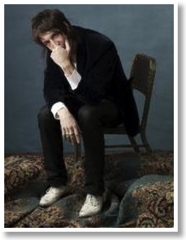Joseph Arthur
Joseph Arthur
Cactus Café
Austin, Texas
One-man band Joseph Arthur’s two-night stint at the Cactus Café in Austin, Texas, began with a hitch before the concert started – his amp blew up. The audience was not let into the quaint venue until another amp was acquired. But once inside, the setting of the intimate performance was revealed: tucked into a corner, a small stage adorned with red drapery and a blank, tall canvas was barely enough room for Arthur and his gang of guitars. A sit-down, two-set show, the singer-songwriter and visual artist was keen on combining the aesthetics of sound and vision.
Running late, the first set was markedly restrained. Witness the skeletal “A Smile That Explodes.” Normally a duet, the defeated, dirge-like song isolated Arthur’s gravelly tenor with his acoustic strumming as his only companion. The song withered with the last lyric: “I write one more letter I won’t send except for across the floor.” The sound of ice rattling in the audience’s glasses could be heard.
 The audience bobbed to the melancholic thump of Arthur’s anxiety-ridden songs. A folk-rock singer-songwriter at heart, his songs flirted with electronic flourishes and eclectic experimentation. The unreleased “Watch Our Shadows Run,” driven by a simple melody and militaristic march, chronicles a relationship marred by betrayal. His falsetto rings nihilistic – “Here comes the sun, watch our shadows run. It’s a war no one ever won” – before launching into a guitar solo that culminates into a dogpile of dissonance and noise rising and falling. Many of Arthur’s songs vamp as different elements are looped and delayed into destruction. Sometimes, he harmonizes with himself as vocals are piled.
The audience bobbed to the melancholic thump of Arthur’s anxiety-ridden songs. A folk-rock singer-songwriter at heart, his songs flirted with electronic flourishes and eclectic experimentation. The unreleased “Watch Our Shadows Run,” driven by a simple melody and militaristic march, chronicles a relationship marred by betrayal. His falsetto rings nihilistic – “Here comes the sun, watch our shadows run. It’s a war no one ever won” – before launching into a guitar solo that culminates into a dogpile of dissonance and noise rising and falling. Many of Arthur’s songs vamp as different elements are looped and delayed into destruction. Sometimes, he harmonizes with himself as vocals are piled.
As the first set wound down, a crowd favorite – “Birthday Card” – was dedicated to a woman in the audience. It brought her to tears. On the last song of the first set, Arthur painted on a blank canvas while singing into the mic. An amorphous, fractured face eventually appeared in front of a monochromatic background. In the span of one, looped song, he depicted the face of a man on the edge of a breakdown, trying to heal.
After a 15-minute intermission, Arthur began his second set as a looser bard. If the first set found him hushed with little stage banter, the next set proved more energetic. The harmonica-laden “I Donated Myself to the Mexican Army” was evidence enough with his voice soaring above a wistful lull. When Arthur stop-started a song, mentioning that his harmonica was out of tune, someone in the audience asked, “What would Bob Dylan do?” Arthur’s response: “Keep playing.”
by Joshua Barajas
Cactus Café
Austin, Texas
One-man band Joseph Arthur’s two-night stint at the Cactus Café in Austin, Texas, began with a hitch before the concert started – his amp blew up. The audience was not let into the quaint venue until another amp was acquired. But once inside, the setting of the intimate performance was revealed: tucked into a corner, a small stage adorned with red drapery and a blank, tall canvas was barely enough room for Arthur and his gang of guitars. A sit-down, two-set show, the singer-songwriter and visual artist was keen on combining the aesthetics of sound and vision.
Running late, the first set was markedly restrained. Witness the skeletal “A Smile That Explodes.” Normally a duet, the defeated, dirge-like song isolated Arthur’s gravelly tenor with his acoustic strumming as his only companion. The song withered with the last lyric: “I write one more letter I won’t send except for across the floor.” The sound of ice rattling in the audience’s glasses could be heard.

As the first set wound down, a crowd favorite – “Birthday Card” – was dedicated to a woman in the audience. It brought her to tears. On the last song of the first set, Arthur painted on a blank canvas while singing into the mic. An amorphous, fractured face eventually appeared in front of a monochromatic background. In the span of one, looped song, he depicted the face of a man on the edge of a breakdown, trying to heal.
After a 15-minute intermission, Arthur began his second set as a looser bard. If the first set found him hushed with little stage banter, the next set proved more energetic. The harmonica-laden “I Donated Myself to the Mexican Army” was evidence enough with his voice soaring above a wistful lull. When Arthur stop-started a song, mentioning that his harmonica was out of tune, someone in the audience asked, “What would Bob Dylan do?” Arthur’s response: “Keep playing.”
by Joshua Barajas


